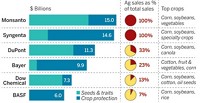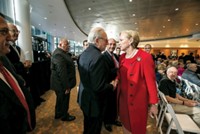Advertisement
Grab your lab coat. Let's get started
Welcome!
Welcome!
Create an account below to get 6 C&EN articles per month, receive newsletters and more - all free.
It seems this is your first time logging in online. Please enter the following information to continue.
As an ACS member you automatically get access to this site. All we need is few more details to create your reading experience.
Not you? Sign in with a different account.
Not you? Sign in with a different account.
ERROR 1
ERROR 1
ERROR 2
ERROR 2
ERROR 2
ERROR 2
ERROR 2
Password and Confirm password must match.
If you have an ACS member number, please enter it here so we can link this account to your membership. (optional)
ERROR 2
ACS values your privacy. By submitting your information, you are gaining access to C&EN and subscribing to our weekly newsletter. We use the information you provide to make your reading experience better, and we will never sell your data to third party members.
Business
Dow And DuPont Log Strong Third Quarter
Finance: Both firms must contend with investor pressure to split themselves up
by Melody M. Bomgardner
October 29, 2014
Strong third-quarter results at Dow Chemical and DuPont are giving executives good reason to boast about how well their strategies are working. But each company’s CEO must also grapple with a volatile and unpredictable global market and repeated calls from activist investors to split into ever-smaller businesses.
Both Dow and DuPont reported significant earnings increases for the quarter. At Dow, earnings shot up 43.6%, even though sales edged up less than 5% compared with the year-ago quarter. The company attributed its success not to a revved up economy but rather to its low-cost feedstocks, geographic diversity, and high operating rates.
Dow reported “tightening demand” in some regions and for certain products. For example, strong demand for performance plastics in Latin America helped power 6% sales growth in emerging economies. With both operating rates and prices on the upswing, the firm’s overall profit margin moved from 4.4% to 6.0%.
Still, Dow’s board and its CEO, Andrew N. Liveris, have been fielding demands from the hedge fund Third Point to split its petrochemical business from its specialties operations. Dow is in the process of divesting up to $6 billion worth of assets, including its chlorine-related businesses, but Liveris is not a fan of the Third Point strategy.
In a conference call with analysts, Liveris said Dow’s ability to grow profits in a volatile economy is due to “the advantage of our integrated and diversified business model,” particularly the firm’s scale, geographic reach, and physical integration.
Liveris struck a practical tone, however, in addressing an analyst’s question about a possible sale of Dow’s agriculture business. “We would look at all options, and if there is going to be consolidation, we would love to be a part of that for more value creation [compared to] owning it ourselves,” he replied.
DuPont CEO Ellen J. Kullman, in her presentation to analysts, pointed to a 20% increase in operating earnings per share for the third quarter as a taste of things to come.
DuPont is in the process of spinning off its industrial chemicals business into a new firm, but investor Nelson Peltz of Trian Fund Management would like Kullman to create two more companies by separating its agriculture, health and nutrition, and industrial biosciences units from its remaining chemicals and materials businesses.
Kullman specifically discussed Trian’s plan in a conference call with analysts, saying, “We know that our businesses enjoy competitive advantages from being part of DuPont.” She rebuffed a suggestion that the board might formally vote on a split.
For the quarter, DuPont’s net earnings expanded by more than a third compared with last year, while sales shrank by 2.9% as a result of portfolio adjustments, a weak agriculture market, and a sluggish economy. Sales grew in only two of seven segments—industrial biosciences and nutrition and health.





Join the conversation
Contact the reporter
Submit a Letter to the Editor for publication
Engage with us on Twitter